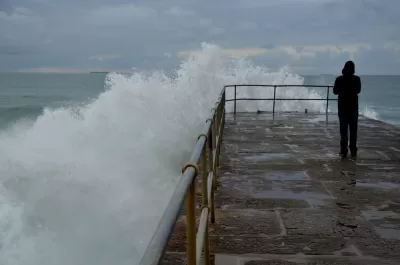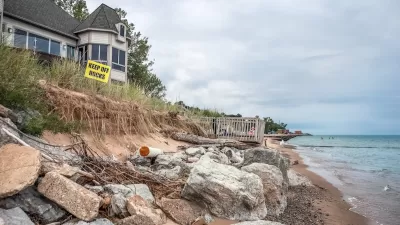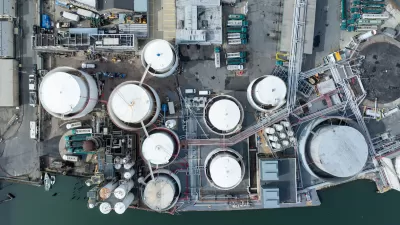A report from Climate Central calls for urgent action, illustrating the potential devastating impact of even a small rise in global temperature on the coastline of major cities.

Even if the world manages to hold climate change down to just a 1.5 degree rise in temperature, reports Ben Adler, the resulting sea level rise will create disastrous conditions in some of the world's major coastal cities. A group of researchers from Climate Central calculated just how much water will rise in cities around the world given a 1.5 degree warming and found that flooding would occur "in and around some key sites."
For example, Santa Monica, California "will lose its beach." Other famous places, such as London's Buckingham Palace, could end up underwater, and "the images of city streets turned to rivers and once-inhabitable buildings sticking out of the water like piers are a striking warning of what may be to come."
Adler reminds us that "[l]ong before an area is actually underwater, it will face regular flooding from heavy rainfalls and storm surges — which are also becoming more frequent and severe because of climate change." Some of the landmarks represented in the study would "have to be abandoned due to rising waters unless dramatic action is taken to save them." Even cities not near the coast would see lasting impacts around the rivers and waterways that connect them to the ocean.
"The consequences of sea level rise will fall hardest in the developing world, where huge populations live in large coastal cities." The report warns that "if greenhouse gas emissions continue at a high level and warming reaches 4°C, '50 major cities, mostly in Asia, would need to defend against globally unprecedented levels of exposure, if feasible, or face partial to near-total extant area losses.'"
The successor to the Paris climate agreement is up for negotiation this November. "Currently, nations have not pledged enough emissions cuts or climate finance to avert the warming scenarios that Climate Central explored, but the organization’s hope is to help spur more aggressive action."
FULL STORY: What climate change and sea level rise will do to American cities

Maui's Vacation Rental Debate Turns Ugly
Verbal attacks, misinformation campaigns and fistfights plague a high-stakes debate to convert thousands of vacation rentals into long-term housing.

Planetizen Federal Action Tracker
A weekly monitor of how Trump’s orders and actions are impacting planners and planning in America.

In Urban Planning, AI Prompting Could be the New Design Thinking
Creativity has long been key to great urban design. What if we see AI as our new creative partner?

King County Supportive Housing Program Offers Hope for Unhoused Residents
The county is taking a ‘Housing First’ approach that prioritizes getting people into housing, then offering wraparound supportive services.

Researchers Use AI to Get Clearer Picture of US Housing
Analysts are using artificial intelligence to supercharge their research by allowing them to comb through data faster. Though these AI tools can be error prone, they save time and housing researchers are optimistic about the future.

Making Shared Micromobility More Inclusive
Cities and shared mobility system operators can do more to include people with disabilities in planning and operations, per a new report.
Urban Design for Planners 1: Software Tools
This six-course series explores essential urban design concepts using open source software and equips planners with the tools they need to participate fully in the urban design process.
Planning for Universal Design
Learn the tools for implementing Universal Design in planning regulations.
planning NEXT
Appalachian Highlands Housing Partners
Mpact (founded as Rail~Volution)
City of Camden Redevelopment Agency
City of Astoria
City of Portland
City of Laramie





























